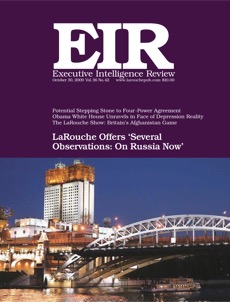Several Observations: On Russia Now
by Lyndon H. LaRouche, Jr.
In response to a report from Russia, the author highlights three major points to be considered to understand the global situation today: 1) the trend since the death of President Kennedy toward a globalized form of physical and financial decline internationally; 2) the rise of globalization, and its forceful enslavement of nations; and 3) the critical consideration: the embedded belief of the majority of people today in universal entropy. This belief is opposed to the reality that both human economies and the human species develop anti-entropically. As an appendix to his report, LaRouche includes a discussion of his Triple Curve forecast, distinguishing the three curves of a monetary economy, with the two curves of a credit economy.
International
LaRouche on Russia-China Cooperation: ‘A Potential Stepping Stone to a Four-Power Agreement’
by Rachel Douglas
Lyndon LaRouche termed the Oct. 13 agreements between Russia and China a significant, smart move in the setting of the global systemic economic crisis, because these agreements mean that China’s U.S. dollar reserves are now worth something real, despite the fall of the dollar, because China is investing its dollars in infrastructure and other physical production.
Yakunin: LaRouche Warnings Were Crucial for Us
LaRouche Sends Greetings: Vernadsky Museum Marks 250th Anniversary
by Lyndon H. LaRouche, Jr.
LaRouche said that the significance of the V.I. Vernadsky State Geological Museum today lies in the need to return the postponed scientific questions of physical economy to the head of the agenda, “both for life on our planet itself, and the broader issues of the conditions of life bearing on human life, and life itself, in nearby regions of our Solar system.”
National
Obama White House Unravels in Face of Depression Reality
by Debra Hanania-Freeman
President Obama’s popularity has undergone a more dramatic decline, during these last nine months, than any U.S. President in more than 50 years. Voter distrust that Washington has their interests at heart is increasing, as the physical economy ratchets downward since the Sept. 30 end of the fiscal year.
Economics
Forget Speculators; We Need Machine-Tool Operators
by John Hoefle
Production of the machine tools in America is all but dead, as sales of these and related technologies plunged 68% in the first eight months of this year. That means not only layoffs, but the decimation of a skilled labor force.
The LaRouche Plan Can Get Us Out of California Water/Food Crisis
by Marcia Merry Baker
Momentum Grows for New Glass-Steagall
by Franklin Bell
Natalia Vitrenko Briefs LaRouche Movement on Crisis and Hope in Ukraine
Dr. Natalia Vitrenko and Vladimir Marchenko, national chairwoman and deputy chairman of the Progressive Socialist Party of Ukraine, and signers of Helga Zepp-LaRouche’s “Call for a New Bretton Woods” more than ten years ago, gave a seminar in Wiesbaden, Germany, to members and friends of the LaRouche movement.
The LaRouche Show
General McChrystal’s Folly: Britain’s Afghanistan Game: Historical Cockpit of War
EIR Counterintelligence Director Jeffrey Steinberg and South Asia specialist Ramtanu Maitra give a strategic and historical overview of this complex region of the world, which almost nobody in the United States understands.
Editorial
Listen to the Wise Words of LaRouche!
by Helga Zepp-LaRouche



